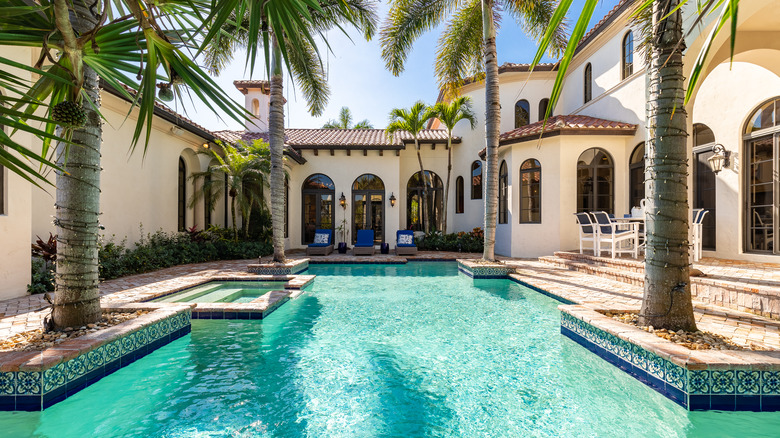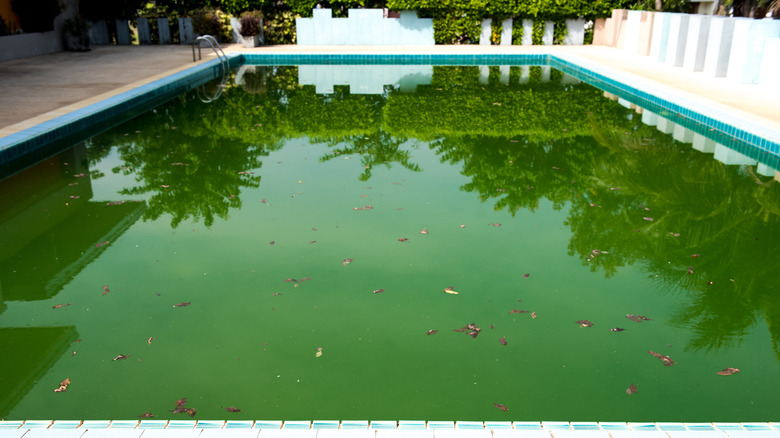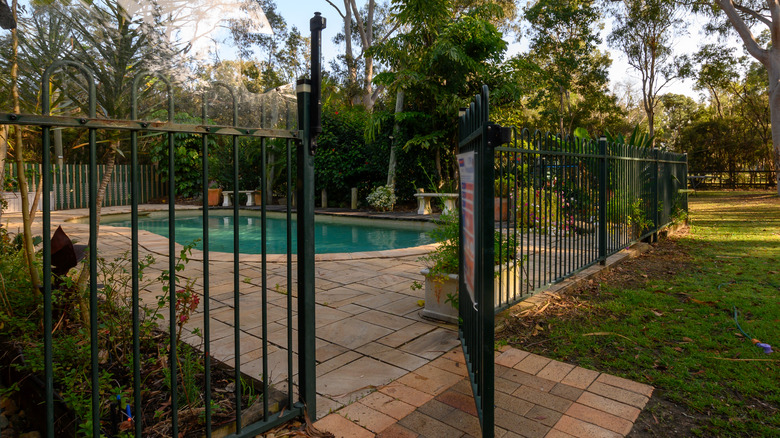What You Should Know Before Purchasing A Home With A Pool
On the surface, purchasing a home with a pool seems like a no-brainer. Lazing in the backyard, swimming on a whim, socializing at home, and getting into tip-top shape... What could be wrong with that? Actually, there are several things to consider before diving in. In spite of its allure, the house/pool combination is a potential minefield. Before purchasing, factor in the many cons as well as the pros. There are a number of red flags that might cause you to remain a landlubber.
For starters, with national averages ranging from around $129,000 in West Virginia to over $848,000 in Hawaii, according to World Population Review, purchasing a home is a pricey affair. Expect additional closing charges in the vicinity of $20,000. Adding a pool to the mix will place even more of a burden on your bank account with maintenance expenses and potential cosmetic upgrades. Utility bills will rise, both for the electricity to run the pool pump, and the water to fill and top it off. You may face higher insurance premiums or have to purchase liability coverage. Moving.com even recommends a $1 million umbrella policy as a hedge against being sued for pool-related accidents.
If the pool or property lacks a fence, local regulations may require one, another expense. For investment purposes, having a pool might add up to 7% of your home's value when reselling, per Kiplinger, but only under certain conditions. In fact, given the drawbacks, a pool may keep some potential buyers at bay.
Pool protocols
As a pool ages, it will invariably need repairs and possibly replacement down the road. Getting a certified pool inspection before purchasing the home is a must, warns Realtor.com. Proactively purchasing a home warranty against future repairs is another good idea, but an additional expense if you decide to buy the house. Be an informed buyer and do your due diligence on the pool building company. Pick the homeowner's brain to establish the pool's age, liner status, and condition of the equipment. Beware of murky water or any obvious defects, per Fishel Pools.
Keep in mind a properly maintained swimming pool requires weekly attention, sometimes even daily. At minimum, it will need to be skimmed and vacuumed. Most important, the water must have a correct pH balance. You will need to purchase or inherit the appropriate equipment, and there will be a regular expense for chemicals. A professional cleaning service may be the answer, further adding to the cost of having a pool. If you prefer to DIY the maintenance, arranging an orientation session from the pool company makes sense, especially considering that improper maintenance can lead to sickness, advises In The Swim. Yearly pool maintenance could drain as much as $2,000 from your bank account, and no pool lasts forever. Chlorine degrades liners, and cracks will form in granite pools. A pool's plumbing may spring a leak, impacting the filter pump and heater. Result: More repairs needed.
Other expenses
Expect property taxes to go up. Your pool will be assessed as an addition to your home, says I Sold My House. On the positive side, you might enjoy a tax reduction if you declare it is for health purposes. In another financial plus, having a pool in a warm-weather location should increase your property's value.
Another expense, but a necessary one, is the cost of adding a fence around your pool or bordering your property. Local regulations or community rules generally require such safety measures. Wise Bread suggests a height of at least four feet. Fences should be equipped with an alarm, as should any doors leading to the pool. Any devices should be placed out of reach of small children. Having a pool without a fence is an invitation to possible legal action or worse. According to Pool Troopers, drowning is responsible for most accidental deaths among toddlers and young children. For safety and insurance reasons, your pool should not have a diving board.
Starting from scratch with a concrete and gunite pool can set you back more than $50,000, not including all the extras. For those who can afford it, building a new home with a swimming pool might be the most economical option, says New Home Source. All caveats aside, the dream of having your own pool might still prevail. Before you take the plunge, be prepared for the time, research, and expenses needed to make your personal oasis worth the trouble.


